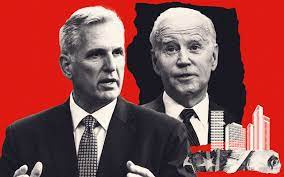Congress Avoids Economic Disaster, Raises Debt Limit Until 2025

Image via The Real Deal
After tense and prolonged negotiations between both the US House and Senate, they have overwhelmingly raised the federal debt ceiling. The ceiling now stands at $31 trillion dollars, after President Biden and House Speaker Kevin McCarthy reached a deal. The deadline, which was originally June 1st, was extended until June 5th, in order to buy more time and avoid a potentially catastrophic default on the US debt. Thankfully, an economic disaster has been avoided.
The nation’s ‘debt ceiling’ is in effect, the nation’s credit card limit. For years, the national debt has been piling up, and there has usually been a last minute panic to raise the ceiling when the deadline nears. In the past few weeks, the debt ceiling deadline began to loom large, and negotiations between Democrats and Republicans quickly began. Like previous years, Republicans, now led by House Speaker Kevin McCarthy, demanded deep cuts to federal spending. Democrats were reluctant to give up so many programs they had championed before. One major concession demanded by the Republicans was work requirements for welfare recipients, one that Democrats were hesitant to give.
Initial reports showed that negotiations between President Biden and McCarthy weren’t going well. When the debt limit deal was announced, numerous conservative Republicans criticized the deal, claiming that McCarthy had caved into Democratic pressure. Over the next few days, dozens of representatives from both sides announced their plans to vote against the debt limit deal. Despite this, the votes on the deal in both chambers passed overwhelmingly, now sending it to President Biden’s desk for signature into law. As a result, members of the conservative House Freedom caucus have threatened to vote McCarthy out of his speakership. One major reason McCarthy was elected speaker in January was that he made major concessions to the Freedom caucus regarding his political power, which included the ability for the Republican caucus to initiate a removal vote at any time.
Although congress may have dodged a bullet yet again, the nation’s debt crisis will resurface again in just two short years. It will likely be a centerpoint of the 2024 presidential election, as President Biden will have to run for re-election after a first term roiled with numerous controversies. While many may think that the US congress will bail out the country every time the debt ceiling deadline looms, many others would say that they can’t be kicked down the road forever. Only time will tell.

Tadek Wieczorek is a Senior at South Lakes High School. He is highly interested in current news and politics, and hopes to channel these interests into...















